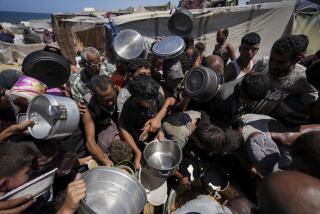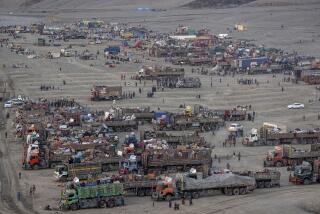250,000 Face Tragedy, U.N. Says of Bosnia
- Share via
ZAGREB, Croatia — More than a quarter-million Bosnian Muslims, under threat from the Serbian “ethnic cleansing” program, are facing a campaign of terror and hunger that could reach “tragic proportions” in the weeks ahead, U.N. relief officials said Tuesday.
Spokesmen for the Office of the U.N. High Commissioner for Refugees said they are increasingly concerned over the fate of about 250,000 Muslim Slavs clustered in the area around Banja Luka in north-central Bosnia-Herzegovina, where U.N. refugee investigators have met with steadily growing hostility from Serbian officials who control the region.
“We’re facing a very serious crisis,” said Peter Kessler, U.N. refugee office spokesman in Zagreb. “These people have been terrorized. They are running out of food, and winter is eight weeks away.
“We are trying to help bring in food supplies,” Kessler went on, “but we have only 66 trucks, and we need 200 at least. It is a horrible situation, and we are in a race against time.”
Over the past several days, the United Nations has sent “protection officers” into cities and towns in the region around Banja Luka in an effort to discourage terrorizing of the area’s Muslim residents, most of whom now want to leave their homes because of the Serbian campaign to drive them out.
The refugee agency also discovered, as it probed into the region for the first time, that the number of would-be refugees is higher than expected. Although most of the Muslims remain in their homes, on the whole they have submitted to the pressure and are ready to leave, U.N. personnel said. Most of the Muslims have been without jobs for more than a year, have run out of money and are beginning to run out of food.
The United Nations is resisting entreaties from the Muslims--and simultaneous pressure from Serbian officials--to organize a mass evacuation because the agency, as Kessler said, “is not going to become a party to ‘ethnic cleansing’ “--the program of moving non-Serbs out of areas claimed by Serbs.
But the protection officers, charged with gathering information on possible human rights abuses but armed with nothing more than their clipboards and their white vehicles with “U.N.” painted on the side, have met with hostile receptions in most places, Kessler said.
“We’re trying to establish a presence,” Kessler said, “and we’re trying to get as many witnesses down there as possible. We want to plant the idea that someone is watching all this and acting as witnesses.”
A U.N. protection officer and another agency staff member who had gone to the Bosnian community of Sanski Most were “basically run out of town” over the weekend, Kessler said.
Muslim residents of Sanski Most, he said, have been forced to fly white flags over their houses. According to the U.N. investigators, the white flags, evocative of surrender, indicate that the Muslims have agreed to sign over their homes and possessions to the city administration, now run by Serbs.
“It’s frightening,” said another U.N. official. “It’s like being forced to wear an armband or a Star of David on your coat, as the Jews were forced to do by the Nazis.”
The refugee officials said they were urging human rights organizations such as Amnesty International, the International Rescue Committee and Helsinki Watch to send representatives to the area to try to halt the harassment of Muslims.
“The message we are trying to get across to the local officials there,” Kessler said, “is that they will be held accountable for the safety and welfare of these people when all of this is over.”
The issue of “war crimes,” he said, is not mentioned directly to the officials but remains implicit. “What’s going on there is similar to the sorts of things that have happened in other conflicts where there have been war crimes trials,” he said.
In most towns in the region, mosques have been destroyed and hundreds of men of fighting age have been removed to detention camps, according to refugee officials and townspeople. The residents of Bosanska Kostajnica told reporters over the weekend that Serbian gunmen terrorized the Muslim neighborhood at night, riding through the streets firing guns into the air. About 800 Muslims are left in the town, and their leaders say they want to go as soon as possible.
In addition to the estimated 250,000 Muslims around Banja Luka, there are about 28,000 to 35,000 in an area northeast of Bosanski Novi, a group that the Serbian authorities urged the United Nations to evacuate last week. U.N. officials refused. An additional 300,000 Muslims are also sealed off in the area known as the Bosanska Krajina, between Bihac and Velika Kladusa in the northwest corner of Bosnia.
The latter group, for the time being, has appeared determined to resist expulsion. Observers note, however, that food supplies, particularly in Bihac--which has a population of 70,000--are running low.
The Muslims targeted for expulsion say they are frightened of the winter, when garden vegetables will no longer be available and when many of them will be unable to heat their homes.
Beyond the United Nations’ dilemma over whether or not to help evacuate the Muslims lies the question of where they might be taken if they are evacuated.
Croatia, with a population of 4.3 million, has already accepted 334,000 Bosnian refugees, and relief officials say the country may be unable to accept additional large numbers.
Germany has so far accepted about 200,000 refugees from the fighting in the former Yugoslav republics. The rest of Western Europe has been reluctant to accept the displaced victims of the conflict.
Other Balkan developments, according to news agencies:
* Nearly 1,000 women and children escaped the Bosnian capital of Sarajevo and the terrors of war Tuesday. The 17-bus convoy carrying the refugees from the fighting left for Belgrade, the Serbian and Yugoslav capital. The United Nations provided two armored cars as escorts.
* Radar from unidentified forces locked onto a British Hercules C-130 aid plane as it was leaving the Sarajevo airport Tuesday, according to the British Defense Ministry and U.N. officials at the airport. Locking on with radar is a possible first step to firing, but there was no confirmation that the plane was fired on. The airport was closed indefinitely to relief airlifts, but not to flights of peacekeeping troops, U.N. spokeswoman Nadia Younes said in New York.
* A congressional report released in Washington on Tuesday documents a campaign of terror in Bosnia that includes random and targeted murders. The document, the first official U.S. government report on the horrors, says that the “ethnic cleansing” of Muslims in Serb-inhabited areas has largely been accomplished.
* Prime Minister John Major’s office announced Tuesday in London that Britain is offering the United Nations an army battalion to escort aid columns in Bosnia. After a 5 1/2-hour Cabinet meeting, Major said it is urgent to step up aid to the war victims because they are facing the coming winter unprepared.
A British government source, speaking on condition of anonymity, said Britain is ready to make available on request up to 1,800 ground troops and support staff to escort relief convoys with the “blue helmets” of the United Nations. But the troops would not defend convoys that come under attack from warring militias as they attempt to deliver their humanitarian cargo, the source said.
* Leaders of Bosnia’s warring factions agreed Tuesday to U.N. supervision of all heavy weapons around Sarajevo. “If this agreement works, there will be no shelling in Sarajevo,” said Zaim Backovic, a deputy commander of the Bosnian forces.
More to Read
Sign up for Essential California
The most important California stories and recommendations in your inbox every morning.
You may occasionally receive promotional content from the Los Angeles Times.










